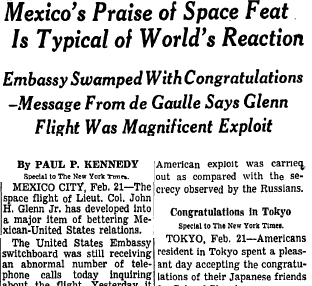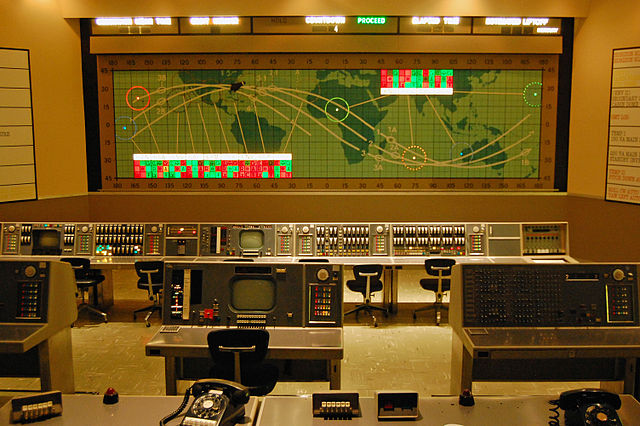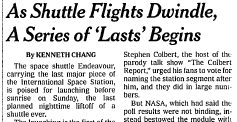This Week in History:
February 16-22, 1962
John Glenn’s Mission –
The World Applauds with Joy
at America’s Accomplishment
and February 2010
Obama Cancelling the U.S. Manned Space Program;
Anglo-American Wars Spread Chaos
by Anton Chaitkin
February 2014
 "Mexico's Praise of Space Feat Is Typical of World's Reaction" By PAUL P. KENNEDY Special to The New York Times. New York Times (1923-Current file); Feb 22, 1962; ProQuest Historical Newspapers, The New York Times (1851 - 2009) pg. 12. |
Riding the Mercury 6 spacecraft, Lt. Col. Glenn was the first American to orbit the Earth. The New York Times headline (2/22/1962) read, “Mexico’s Praise of Space Feat Is Typical of World’s Reaction.”
Many nations cherished the U.S. success, as they were partners of President John Kennedy’s America in the development of their own future.
Mexicans cheered. The Times reported that country “has felt close to the projected astronaut flight because one of the more important tracking stations for the flight is near Guaymas, in the northern state of Sonora. This station, in which Mexican scientists are assisting, had the responsibility of guiding the astronaut back into the atmosphere if anything went wrong during the first two orbits.”
Charles de Gaulle sent a message: “The magnificent exploit of John Glenn does honor to the great American people….” A week after the space flight, Attorney General Robert F. Kennedy met with de Gaulle in Paris to confirm U.S. support to the French President – de Gaulle was being threatened with armed insurrection for his decision to end France’s bloody colonial war in Algeria.
Japanese were thrilled. The “warmth and personal quality of congratulations from nonpolitical Japanese made it quite clear that in [Japan] the adventure of Colonel Glenn was seen … as a recovery of at least part of the `face’ lost by Soviet advances in the space race.”
The U.S. mission was “hailed with joy in Athens …. the Greek Astronautica Society invited Colonel Glenn to Greece.”

Source: Wikipedia: http://en.wikipedia.org/wiki/File:Mercury_Control_Debus.jpg#file Author: Bubba73(You talkin' to me?).
This work is licensed under the Creative CommonsAttribution-ShareAlike 3.0 License. Mercury Control reproduced in the Debus Center of Kennedy Space Center Visitor Complex |
Brazil “hailed Colonel Glenn’s globe-circling flight as … a political victory for the free world.” When Brazilian President Joao Goulart visited the White House two months later, President Kennedy said, “Twenty-six years ago, President Franklin Roosevelt, in visiting Brazil … committed the United States to a great national and international effort to provide a more prosperous and fruitful life for the people of the Western Hemisphere.Brazil has attempted … to do that within her own country and within Latin America… And we have been attempting together in the Alianza para Progreso in the last 15 months to work together … to provide housing for our people, education for our children, employment for our workers, security for our older citizens, a better and more secure life for our farmers ….”
Ghana’s President Kwame Nkrumah of sent JFK this message: “the government and people of Ghana rejoice with you in this hour of triumph. Please accept my personal congratulations.” The previous year, Nkrumah had been the first foreign head of state to visit the Kennedy White House. Kennedy committed the United States to sponsor the building of Nkrumah’s visionary project, the Akosombo dam on the Volta River, to provide electricity for the industrialization of west Africa.
Indonesia’s Foreign Minister Subandrio declared that the Glenn mission “deserves our highest praise as a triumph of mankind in applying the progress of technology for probing outer space in the interest of world peace.” Robert Kennedy had just left Indonesia when Glenn was launched into orbit. RFK had spoken there
on the political importance of defeating imperialism; he went on from there to the Netherlands to deliver President Kennedy’s message, that the Dutch should remove their remaining military from Indonesia’s West Irian province on the island of New Guinea -- under pressure, the Dutch pulled out. President Kennedy subsequently pushed through American aid for industrialization of Indonesia, including U.S. financing for an experimental nuclear reactor.
February 6, 2010: Obama Cancelling the U.S. Manned Space Program;
Anglo-American Wars Spread Chaos
 "As Shuttle Flights Dwindle, A Series of 'Lasts' Begins" by Kenneth Chang. New York Times (1923-Current file); Feb 6, 2010; ProQuest Historical Newspapers, The New York Times (1851 - 2009) pg. A11. |
A New York Times story February 6, 2010, headlined “As Shuttle Flights Dwindle, A Series of `Lasts’ Begins,” reported “Shuttle officials … acknowledged the potential turmoil in NASA’s future after President Obama proposed last week to cancel Constellation, NASA’s [rocket] program that was to return astronauts to the Moon.”
Michael Leinbach, the space shuttle launch integration manager, told a press conference February 5, “Every launch is a little bitter-sweet. We’re one closer to the end.” The entire space shuttle program was to be shut down; the last launch was on July 8, 2011.
In this era the U.S. was participating in wars in wars and insurrections in Iraq, Afghanistan, Syria, Pakistan, Libya, throughout Africa, and in much of the rest of the globe. The Malthusian Green Agenda which ended its own manned space program had also replaced the historic American commitment to industrialization to end poverty.
